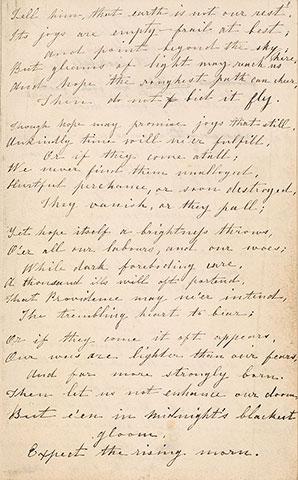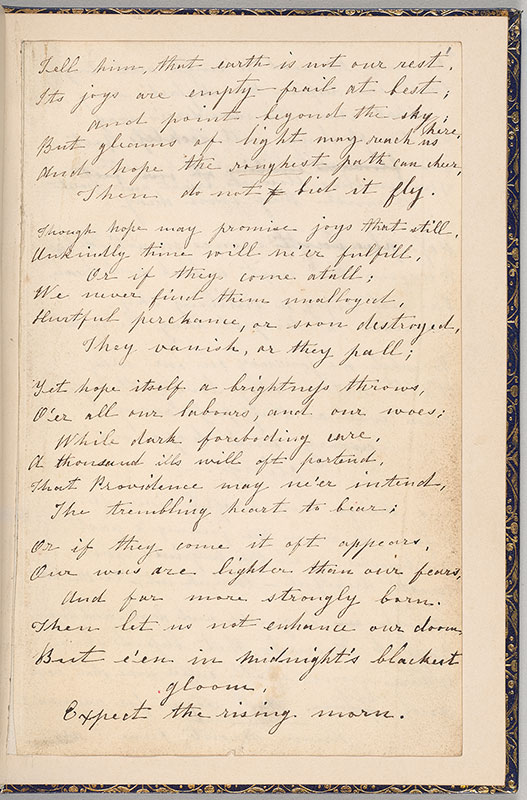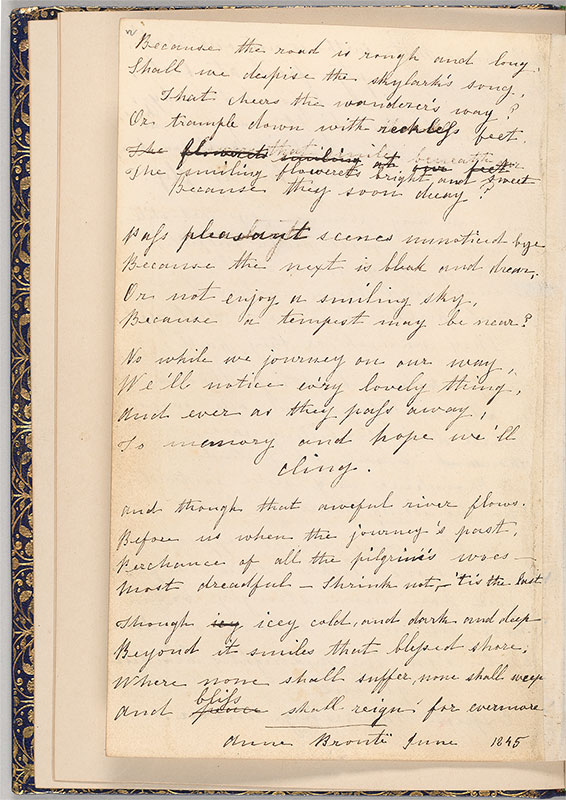Anne Brontë’s “Views of Life”

Anne Brontë wrote the first few stanzas of her poem “Views of Life” in early 1844 and the latter part of the composition around June 1845. The text first appeared in Poems by Currer, Ellis, and Acton Bell (London: Aylott & Jones), the book that Anne and her sisters Charlotte and Emily published pseudonymously in 1846.
This is a two-page manuscript of the final nine stanzas. The first part of the manuscript is in the Henry W. and Albert A. Berg Collection of English and American Literature, The New York Public Library, Astor, Lenox and Tilden Foundations. In manuscript form, the poem is untitled and does not include lines 33–36.
The Morgan manuscript comprises one sheet of paper, written on both sides, bound in gold-tooled blue leather. The binding was likely created around the turn of the twentieth-century, when numerous Brontë manuscripts were being sold on the autograph market. The binder (who did not sign their work) attached the single manuscript leaf to a larger sheet, added some twenty-four blank sheets to fill out the volume, and gilded the edges of the paper.
Introduction, notes, and manuscript transcriptions by Christine Nelson, Drue Heinz Curator of Literary and Historical Manuscripts, 2019.
Note on the text
A transcription of Brontë’s manuscript text, including cancelled words, is provided. Her original spelling and capitalization are retained. An effort has been made to transcribe her punctuation marks, though many are ambiguous. The poem first appeared in Poems by Currer, Ellis, and Acton Bell (London: Aylott & Jones, 1846); the published text is provided below the manuscript text to allow for comparison. The poem appears in Edward Chitham’s edition The Poems of Anne Brontë: A New Text and Commentary (London: Macmillan, 1979), poem 42.
Anne Brontë
1820–1849
Views of life : autograph manuscript signed of the last nine stanzas : Haworth, 1845 June
The Henry Houston Bonnell Brontë Collection. Bequest of Helen Safford Bonnell, 1969, MA 2696.8
MA 2696.8, p. 1

Views of life : autograph manuscript signed of the last nine stanzas : Haworth, 1845 June
The Henry Houston Bonnell Brontë Collection. Bequest of Helen Safford Bonnell, 1969
Tell him, that earth is not our rest,
Its joys are empty – frail at best;
And point beyond the sky;
But gleams of light may reach us here,
And hope the roughest path can cheer,
Then do not f bid it fly.
Though hope may promise joys, that still,
Unkindly time will ne’er fulfil,
Or if they come at all;
We never find them unalloyed,
Hurtful perchance, or soon destroyed,
They vanish, or they pall;
Yet hope itself a brightness throws,
O’er all our labours, and our woes;
While dark foreboding care
A thousand ills will oft portend,
That Providence may ne’er intend,
The trembling heart to bear;
Or if they come it oft appears,
Our woes are lighter than our fears,
And far more strongly born.
Then let us not enhance our doom,
But e’en in midnight’s blackest gloom,
Expect the rising morn.
Text as published in Poems (1846)
Tell him, that earth is not our rest;
Its joys are empty–frail at best;
And point beyond the sky.
But gleams of light may reach us here;
And hope the roughest path can cheer:
Then do not bid it fly!
Though hope may promise joys, that still
Unkindly time will ne’er fulfil;
Or, if they come at all,
We never find them unalloyed,–
Hurtful perchance, or soon destroyed,
They vanish or they pall;
Yet hope itself a brightness throws
O’er all our labours and our woes;
While dark foreboding Care
A thousand ills will oft portend,
That Providence may ne’er intend
The trembling heart to bear.
Or if they come, it oft appears,
Our woes are lighter than our fears,
And far more bravely borne.
Then let us not enhance our doom;
But e’en in midnight’s blackest gloom
Expect the rising morn.
MA 2696.8, p. 2

Views of life : autograph manuscript signed of the last nine stanzas : Haworth, 1845 June
The Henry Houston Bonnell Brontë Collection. Bequest of Helen Safford Bonnell, 1969
Because the road is rough and long,
Shall we despise the skylark’s song,
That cheers the wanderer’s way?
Or trample down, with reckless feet,
The [erased: flowers that smile beneath our] flowerets smiling at our feet
The smiling flowerets bright and sweet
Because they soon decay?
Pass pleasant scenes unnoticed bye
Because the next is bleak and drear;
Or not enjoy a smiling sky,
Because a tempest may be near?
No while we journey on our way,
We’ll notice on ev’ry lovely thing,
And ever as they pass away,
To memory and hope we’ll cling.
And though that awful river flows,
Before us when the journey’s past,
Perchance of all the pilgrim’s woes –
Most dreadful – shrink not – ’tis the last!
Though icy icey cold, and dark and deep
Beyond it smiles that blessed shore,
Where none shall suffer, none shall weep
And peace bliss shall reign for evermore
———————
Anne Brontë June 1845
Text as published in Poems (1846)
Because the road is rough and long,
Shall we despise the skylark’s song,
That cheers the wanderer’s way?
Or trample down, with reckless feet,
The smiling flowerets, bright and sweet
Because they soon decay?
Pass pleasant scenes unnoticed by,
Because the next is bleak and drear;
Or not enjoy a smiling sky,
Because a tempest may be near?
No! while we journey on our way,
We’ll smile on every lovely thing;
And ever, as they pass away,
To memory and hope we’ll cling.
And though that awful river flows
Before us, when the journey’s past,
Perchance of all the pilgrim’s woes
Most dreadful–shrink not–’tis the last!
Though icy cold, and dark, and deep;
Beyond it smiles that blessed shore,
Where none shall suffer, none shall weep,
And bliss shall reign for evermore!